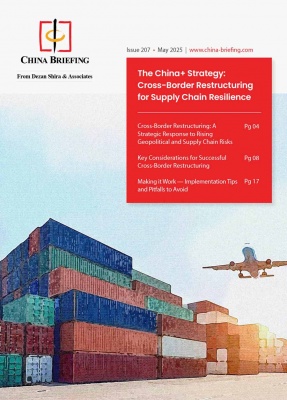Can Hong Kong Capitalize on US Delisting Risks Facing Chinese Companies?
US delisting risks are pushing Chinese companies to seek refuge in Hong Kong, which is emerging as a compelling alternative amid rising financial decoupling pressures. This article examines how the city’s regulatory reforms, capital market depth, and strategic location position it as both a fallback and a springboard—though not without competitive and political headwinds
The specter of US-China financial decoupling has returned to the spotlight, following renewed delisting threats from the Trump administration. In February 2025, the administration issued a memo under its “America First Investment Policy” that revived enforcement of the Holding Foreign Companies Accountable Act (HFCAA), signaling that Chinese firms failing to meet US audit standards could once again face expulsion from American exchanges. Treasury Secretary Scott Bessent’s remark that “everything’s on the table” has reignited investor anxiety and prompted firms to reassess their capital market strategies.
The stakes are significant. As of early 2025, 286 Chinese companies remain listed in the US, with a combined market capitalization of over US$1.1 trillion. US institutional investors hold approximately US$830 billion in Chinese equities, underscoring the scale of potential disruption. For many firms, American Depositary Receipts (ADRs) are no longer the secure gateway they once were.
Against this backdrop, the question arises: can Hong Kong position itself as a viable alternative for Chinese firms navigating geopolitical headwinds? This article explores how Hong Kong’s evolving capital market infrastructure, policy support, and cross-border integration may enable it to serve as both a buffer and a strategic beneficiary in a new era of financial realignment.
Understanding the potential risks for Chinese firms and global investors
At the core of the delisting dispute lies the long-running issue of audit transparency. Under the HFCAA, foreign companies that fail to meet US audit inspection requirements for three consecutive years face mandatory removal from American exchanges. Chinese authorities have historically blocked access to audit records, citing national security concerns—a tension that has reignited under the Trump administration’s 2025 directive to enforce stricter financial standards.
The potential fallout extends well beyond individual firms. A significant portion of Chinese companies listed in the US trade through ADRs, with a daily turnover of approximately US$8.1 billion, according to Morgan Stanley. If mass delistings occur, institutional divestment from passive funds and index-tracking vehicles could follow, triggering sharp valuation drops and disrupting global investor portfolios. Goldman Sachs has warned that US institutional investors may need to offload substantial holdings if financial decoupling deepens further.
Recent history offers cautionary signals. In 2020, Luckin Coffee was delisted after accounting fraud revelations, and several high-profile companies—including Alibaba and PDD Holdings—have since been flagged for noncompliance under HFCAA. These cases underscore the operational and reputational risks firms face as regulatory scrutiny intensifies. For many, the need to secure a more stable and geopolitically insulated listing venue has become a strategic imperative.
Hong Kong’ role as a safe habor for returning firms
As delisting risks intensify, Hong Kong has emerged as the most viable alternative for Chinese firms seeking continuity in offshore capital access. Compared to the 2020 audit crisis, the city is now significantly more prepared—offering a regulatory, liquidity, and policy environment tailored to absorb and support these transitions.
Regulatory adaptations
Over the past few years, Hong Kong has actively reformed its listing regime to accommodate returning Chinese companies. As of 2025, over 75 percent of US-listed Chinese firms by market value now hold either a secondary or dual-primary listing on the Hong Kong Stock Exchange (HKEX), reflecting a clear shift in market strategy.
The expansion of Weighted Voting Rights (WVR) provisions has further increased the attractiveness of Hong Kong as a listing venue, especially for founder-led tech companies. Additionally, the inclusion of WVR companies and pre-revenue biotech firms in Stock Connect programs has broadened market accessibility. Recent enhancements such as the ETF Connect and RMB trading counters have also created new channels for institutional and mainland capital to engage with Hong Kong-listed assets.
Capital and liquidity support
A key strength of Hong Kong’s role as a buffer lies in its liquidity foundation. The Southbound leg of the Stock Connect program has seen average daily turnover reach HK$46 billion (approx. US$5.9 billion) in 2025, providing robust capital inflow from mainland investors. This southbound flow is increasingly driven by what analysts term the “patriot premium”—a willingness among Chinese investors to support national champions. This dynamic not only helps stabilize market sentiment but also ensures sustained demand for strategic listings during periods of external volatility.
While concrete estimates vary, financial institutions and market observers broadly agree that Hong Kong’s infrastructure is well-positioned to accommodate increased trading volumes should Chinese firms accelerate their shift away from US exchanges. With expanding market programs, regulatory enhancements, and strong support from both retail and institutional investors, the city continues to demonstrate its capacity to manage sizable capital inflows with confidence.
Policy infrastructure
Hong Kong’s position is further reinforced by targeted policy measures aimed at facilitating the transition of returning Chinese firms. Regulatory authorities have expedited secondary listing approvals and broadened access under programs such as Swap Connect, allowing eligible institutions to hedge risks using offshore derivatives instruments.
Meanwhile, the Fast Track mechanism streamlines the application process for qualified issuers, particularly those in strategic sectors, helping reduce time-to-market and regulatory friction. The approval times for secondary listings have been streamlined to under 60 days since 2021, helping firms pivot quickly in response to shifting geopolitical risks. These efforts underscore Hong Kong’s role not just as a passive recipient of capital, but as a proactive platform aligned with China’s broader financial reform and connectivity agenda.
Together, these reforms and programs form a comprehensive safety net—one that positions Hong Kong not just as a fallback option, but as a credible long-term hub for Chinese enterprises navigating a shifting global capital landscape.
Expanding regulatory access for tech and biotech firms
In May 2025, Hong Kong launched the “Tech Fast Lane” (科企专线) initiative to bolster its status as a premier listing hub for high-growth and pre-commercial companies. Jointly introduced by the Securities and Futures Commission (SFC) and the Hong Kong Stock Exchange (HKEX), the program offers earlier and more targeted regulatory support for specialist tech and biotech firms.
A dedicated review team now works directly with prospective applicants, particularly those seeking to list under Chapter 18A (biotech) and Chapter 18C (specialist tech), to provide guidance on listing eligibility, product maturity, sector classification, and voting rights structures. Companies adopting weighted voting rights (WVR) frameworks that meet the requirements of Chapter 18A or 18C are also deemed to satisfy the Chapter 8A innovation criteria, streamlining the approval process.
Significantly, eligible companies may now submit listing applications confidentially, helping address competitive and intellectual property concerns. By enhancing regulatory transparency and responsiveness, the Tech Fast Lane strengthens Hong Kong’s position as the IPO destination of choice for innovation-driven enterprises across Asia.
Strengthening Hong Kong’s strategic position in global finance
Building on the financial strength of returning firms and the government’s support for strategic enterprises, Hong Kong is increasingly viewed not just as a fallback. Rather than simply restoring its pre-2020 role, the city is positioning itself as what HSBC analysts call the “world’s first post-Western financial hub”—a market increasingly oriented around regional capital, regulatory independence, and alignment with Mainland China’s long-term strategic priorities.
While Hong Kong benefits from absorbing returning Chinese firms, it is not alone in this evolution. The rapid development of Shanghai’s STAR Market and Shenzhen’s ChiNext board underscores Beijing’s broader push for financial self-sufficiency. These domestic exchanges now rival US platforms in tech IPO activity, and together with Hong Kong, form a tri-polar capital market ecosystem that reduces dependence on Western financial infrastructure.
Chinese firms themselves are adapting to this realignment. Many of the country’s largest tech companies—such as Tencent and Alibaba—now possess a combined cash reserve exceeding US$150 billion, reducing their need for US fundraising altogether. Meanwhile, Beijing’s “little giants” program continues to channel state support toward strategically important small and mid-sized enterprises, particularly in advanced manufacturing and core technologies. These firms increasingly turn to domestic and Hong Kong markets for capital, strengthening the city’s relevance in funding China’s innovation ambitions.
In this shifting landscape, Hong Kong’s role is no longer reactive but strategic. Its enhanced institutional capacity, deepening integration with the Chinese Mainland, and increasing appeal to globally mobile capital place it in a unique position to consolidate its standing—even as global financial flows reorient away from traditional Western centers.
Comparing Hong Kong with other global financial hubs
While Hong Kong is actively reinforcing its role as a capital market for Chinese firms, it faces growing competition from other global financial centers—particularly London and Singapore, both of which are stepping up efforts to attract Asia-based companies amid shifting geopolitical alignments.
Singapore has emphasized political neutrality, regulatory transparency, and a business-friendly environment, positioning itself as a stable gateway for Southeast Asian capital and multinational regional headquarters. It has also expanded bilateral frameworks with China, such as the Chongqing Connectivity Initiative, and is increasingly seen as a hedge location for capital wary of geopolitical friction.
London, despite Brexit-related uncertainty, remains a trusted financial hub with strong institutional credibility and global investor confidence. The UK has made recent efforts to deepen trade and investment ties with China, while promoting the London Stock Exchange as an alternative listing venue for international companies, including Chinese tech and green energy firms.
Against this backdrop, Hong Kong retains distinct advantages—particularly in terms of proximity to the Chinese Mainland, capital market access via Stock Connect, and regulatory frameworks tailored to Chinese corporate structures like WVR. However, its growing reliance on mainland capital flows also presents risks. With 45 percent of liquidity now provided by Chinese investors, any downturn in domestic sentiment could impact overall market stability.
Moreover, geopolitical perception risks remain a persistent concern. While Beijing’s backing provides policy consistency, international investors continue to monitor Hong Kong’s autonomy and rule-of-law environment—factors that weigh on its appeal relative to politically neutral markets like Singapore.
To maintain its competitive edge, Hong Kong may need to continue diversifying its investor base, reinforcing institutional transparency, and balancing its unique access to China with the credibility needed to attract global capital. Its ability to do so will be critical as other hubs compete for the same strategic listings and investor trust.
Turning a geopolitical crisis into a market opportunity
The current wave of delisting threats is not Hong Kong’s first brush with external financial pressure—but it may be the one it is best prepared to navigate. Unlike in 2020, the city now benefits from structural reforms and deeper integration—positioning it to serve as a core financial gateway amid realignment. Accelerated listing reforms, improved liquidity channels, and closer integration with mainland capital markets have transformed the city from a secondary listing option into a credible first-choice platform.
While the risks of financial decoupling between the US and China remain very real, they are no longer destabilizing by default. If anything, they are now part of a broader realignment in which Hong Kong plays a central role. With many major Chinese firms already establishing secondary or dual listings in the city, and growing southbound flows reinforcing its capital base, Hong Kong is increasingly seen not just as a fallback—but as a durable, globally competitive financial hub.
Looking ahead, the key question is whether Hong Kong can capitalize on this momentum to become the default global venue for Chinese capital—a platform that combines international investor access with policy alignment to China’s strategic goals. Doing so will require continued policy agility, diversification of its investor base, and careful management of external perceptions.
If successful, Hong Kong may not only weather the current storm but emerge from it with an even stronger claim to its role as Asia’s most globally connected financial center.
About Us
China Briefing is one of five regional Asia Briefing publications, supported by Dezan Shira & Associates. For a complimentary subscription to China Briefing’s content products, please click here.
Dezan Shira & Associates assists foreign investors into China and has done so since 1992 through offices in Beijing, Tianjin, Dalian, Qingdao, Shanghai, Hangzhou, Ningbo, Suzhou, Guangzhou, Haikou, Zhongshan, Shenzhen, and Hong Kong. We also have offices in Vietnam, Indonesia, Singapore, United States, Germany, Italy, India, and Dubai (UAE) and partner firms assisting foreign investors in The Philippines, Malaysia, Thailand, Bangladesh, and Australia. For assistance in China, please contact the firm at china@dezshira.com or visit our website at www.dezshira.com.
- Previous Article China’s Pilot Free Trade Zones – New Opinions Signal Further Regulatory Easing
- Next Article EU-China Relations After the 2024 European Elections: A Timeline



























